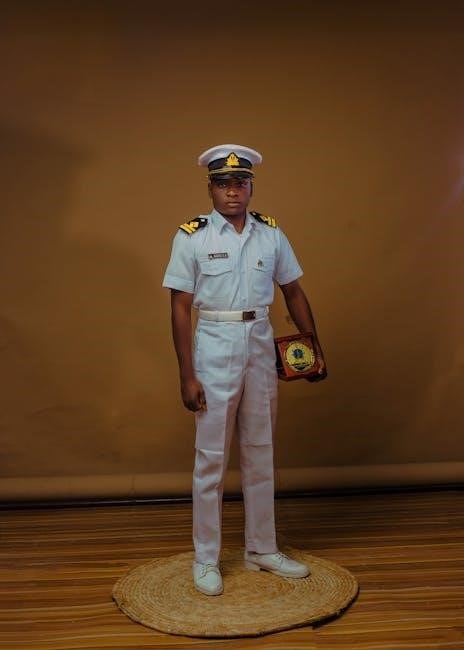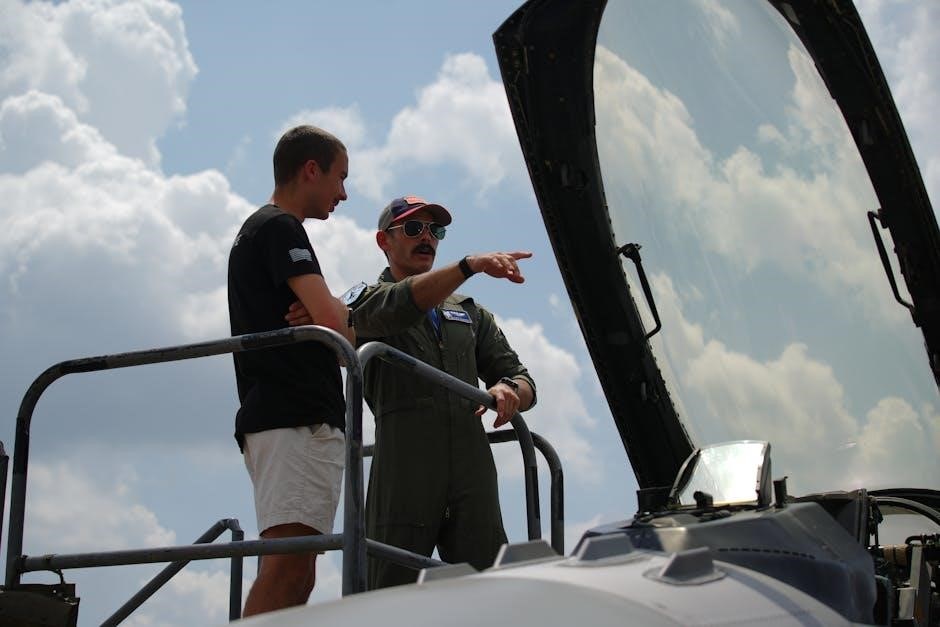navy cmeo instruction

navy cmeo instruction
The Navy’s Command Managed Equal Opportunity (CMEO) instruction promotes a culture of inclusion, respect, and equal treatment for all personnel, ensuring a fair and discrimination-free environment. This instruction outlines policies and procedures to address harassment, bias, and other equal opportunity issues, fostering unity and readiness within the fleet. It ensures all sailors and civilians are treated with dignity and respect, aligning with the Navy’s core values and mission success.
Definition and Purpose of CMEO
The Command Managed Equal Opportunity (CMEO) program is a Navy initiative designed to promote equality, prevent discrimination, and address harassment within the naval workforce. Its primary purpose is to ensure all personnel are treated fairly and with respect, fostering an inclusive and equitable environment. CMEO provides guidelines and training to help commands identify and address bias, ensuring equal opportunity in recruitment, assignments, and promotions. By addressing these issues, CMEO aims to enhance unit cohesion, readiness, and mission success. It also serves as a framework for resolving equal opportunity complaints and ensuring compliance with Navy policies and federal laws.

Overview of Navy Equal Opportunity Policies
The Navy’s Equal Opportunity (EO) policies are comprehensive guidelines aimed at eliminating discrimination and promoting inclusivity across all ranks. These policies ensure equal treatment of all personnel regardless of race, gender, religion, or national origin. They emphasize a zero-tolerance stance on harassment and discrimination, providing clear procedures for reporting and addressing such incidents. The policies also outline expectations for leadership to foster a respectful and inclusive command climate. By adhering to these guidelines, the Navy strives to maintain a workforce that reflects diversity and ensures equal opportunities for all. This framework supports the Navy’s mission by promoting unity, teamwork, and operational effectiveness.

Structure of the CMEO Program
The CMEO program is structured to ensure equal opportunity and prevent harassment through training, monitoring, and support systems. It includes clear policies, reporting mechanisms, and accountability measures to address issues promptly and effectively, fostering a culture of respect and inclusion within the Navy.

Key Components of CMEO
The key components of the Navy’s Command Managed Equal Opportunity (CMEO) program include mandatory training for all personnel, clear policies against harassment and discrimination, and established reporting procedures. These elements work together to create a culture of respect and inclusion, ensuring that all sailors and civilians are treated fairly. The program also emphasizes accountability, with consequences for violations, and provides support systems for those affected by harassment or discrimination. By addressing these critical areas, CMEO helps maintain unit cohesion and operational readiness, aligning with the Navy’s mission to foster a professional and inclusive environment.
Roles and Responsibilities
Under the Navy’s CMEO instruction, roles and responsibilities are clearly defined to ensure effective implementation. Command Climate Specialists serve as liaisons between commands and the Navy’s Sexual Harassment Prevention and Equal Opportunity Office, providing guidance and support. Commanding Officers (COs) and Officers-in-Charge (OICs) are responsible for fostering an inclusive environment, enforcing policies, and addressing incidents promptly. They must ensure all personnel receive training and understand their rights and obligations. Additionally, all sailors and civilians are expected to uphold equal opportunity principles, report violations, and support efforts to maintain a respectful workplace. These roles and responsibilities are critical to achieving the Navy’s goal of a fair and inclusive command climate.

Implementation of CMEO in the Navy
The Navy implements CMEO through structured training, awareness programs, and support systems, ensuring all personnel understand and adhere to equal opportunity principles and procedures effectively.
Training and Awareness Programs
The Navy conducts mandatory CMEO training to educate personnel on equal opportunity policies, harassment prevention, and diversity inclusion. These programs are designed to foster a culture of respect and ensure all sailors understand their roles in maintaining a fair and inclusive environment. Training sessions include interactive modules, case studies, and scenario-based exercises to enhance understanding and practical application. Additionally, awareness campaigns are implemented to promote the importance of equal opportunity and prevent discrimination. Regular updates to training materials ensure alignment with evolving policies and address emerging issues, reinforcing the Navy’s commitment to a discrimination-free workplace.
Monitoring and Reporting Mechanisms
The Navy employs robust monitoring and reporting mechanisms to ensure compliance with CMEO policies and address potential violations. These systems include regular command climate assessments, audits, and inspections to evaluate equal opportunity practices. Sailors are encouraged to report incidents of discrimination, harassment, or unfair treatment through designated channels, such as chain of command, equal opportunity advisors, or online reporting tools. Confidentiality and protection from retaliation are emphasized to foster trust in the reporting process. Additionally, training programs and awareness campaigns reinforce the importance of monitoring and reporting, ensuring all personnel understand their roles in maintaining a fair and inclusive environment. These mechanisms are critical to identifying and addressing issues promptly, upholding the Navy’s commitment to equal opportunity for all.

CMEO and Sexual Harassment Prevention
The Navy’s CMEO instruction explicitly addresses sexual harassment as a critical component of its equal opportunity mission, integrating prevention strategies and support systems to ensure a safe and respectful environment for all personnel.
Intersection of CMEO and Anti-Harassment Efforts
The Navy’s CMEO program is deeply intertwined with anti-harassment initiatives, ensuring a unified approach to preventing and addressing discrimination, harassment, and other harmful behaviors. By integrating equal opportunity principles with anti-harassment policies, the Navy fosters an environment of respect and inclusion. CMEO instruction mandates comprehensive training, clear reporting mechanisms, and robust support systems for victims. This dual focus ensures that all forms of harassment are actively mitigated, promoting a culture of dignity and professionalism. The program also emphasizes collaboration between command leadership and support offices to maintain a zero-tolerance stance on harassment, aligning with the Navy’s broader mission of readiness and cohesion.
Support Systems for Victims
The Navy’s CMEO program establishes robust support systems for victims of harassment or discrimination, ensuring they receive timely and effective assistance. These systems include access to counseling services, legal support, and confidential reporting channels. Victims are protected from retaliation through strict anti-retaliation policies, and their privacy is safeguarded throughout the process. Additionally, the Navy provides training for command personnel to recognize and respond appropriately to incidents, fostering a supportive and inclusive environment. These measures aim to empower victims, ensure their well-being, and uphold justice within the Navy’s ranks, reflecting the commitment to a culture of respect and dignity.

Addressing Violations of CMEO
The Navy’s CMEO program addresses violations through structured reporting procedures, thorough investigations, and appropriate disciplinary actions to maintain accountability and ensure a fair and just environment.

Procedures for Reporting and Investigating Incidents
The Navy’s CMEO program establishes clear procedures for reporting and investigating incidents of harassment or discrimination. Service members are encouraged to report concerns through their chain of command or to designated Equal Opportunity Representatives. Reports are documented and reviewed to ensure thorough investigation. Command Climate Specialists play a key role in overseeing the process, ensuring fairness and confidentiality. Investigations are conducted promptly, with findings reviewed by senior leadership to determine appropriate actions. This structured approach ensures accountability and maintains a culture of respect and inclusion, aligning with the Navy’s commitment to equal opportunity for all personnel.
Disciplinary Actions and Consequences
Violations of the Navy’s CMEO policies result in disciplinary actions to maintain accountability and uphold equal opportunity standards. Commanders are responsible for enforcing consequences, which may include corrective training, administrative actions, or legal proceedings under the Uniform Code of Military Justice. Repeat or severe offenses can lead to more severe penalties, such as rank reduction or separation from service. These measures ensure that incidents are addressed fairly and consistently, protecting victims and maintaining unit cohesion. The Navy emphasizes zero tolerance for harassment or discrimination, with clear consequences to deter misconduct and promote a respectful command climate.
Impact and Effectiveness of CMEO
The Navy’s CMEO instruction has improved workplace culture, reduced harassment incidents, and increased inclusivity. Its effectiveness is evident in stronger reporting mechanisms and accountability measures, fostering a respectful environment.
Evaluation of CMEO Initiatives
Evaluation of CMEO initiatives involves assessing their effectiveness in promoting equal opportunity and preventing harassment. Regular audits, surveys, and feedback from personnel are used to measure the impact of these programs. Metrics such as incident reports, training participation rates, and climate assessments provide insights into the success of CMEO efforts. Continuous monitoring ensures that policies are enforced consistently across all commands, and areas needing improvement are identified promptly. This data-driven approach allows the Navy to refine its strategies, ensuring that CMEO initiatives remain effective in fostering an inclusive and respectful environment. Such evaluations are critical for maintaining the integrity and progress of the program.
Case Studies and Success Stories
Case studies highlight the positive impact of CMEO initiatives in fostering inclusive environments within the Navy. For instance, Command A implemented targeted training programs, resulting in a significant reduction in harassment reports and improved morale. Command B utilized CMEO guidelines to address bias in promotion processes, ensuring fair opportunities for all sailors. These success stories demonstrate how effective leadership and adherence to CMEO policies can drive meaningful change. By sharing these examples, the Navy encourages other commands to adopt similar strategies, promoting a culture of equality and respect across the fleet. Such outcomes underscore the importance of CMEO in maintaining a cohesive and high-performing naval force.

Future of CMEO in the Navy
The Navy plans to enhance CMEO initiatives by integrating advanced training technologies and strengthening partnerships with advocacy groups to foster a more inclusive environment.
Planned Improvements and Updates
The Navy plans to enhance the CMEO program by integrating advanced training modules, leveraging digital platforms for real-time feedback, and expanding data analytics to track trends and refine policies. Updates will include more robust reporting mechanisms, ensuring incidents are addressed promptly and fairly. Additionally, the program will incorporate insights from advocacy groups to align with best practices in fostering inclusion. Regular updates to training materials will reflect evolving societal norms and legal standards, ensuring the program remains relevant and effective. These improvements aim to strengthen the Navy’s commitment to equal opportunity and harassment prevention, creating a more resilient and inclusive force.
Challenges and Opportunities Ahead
The Navy’s CMEO program faces challenges such as evolving definitions of harassment, varying cultural perceptions, and ensuring consistent implementation across all commands. Additionally, addressing underreporting of incidents and fostering trust in reporting mechanisms remain critical issues. However, these challenges also present opportunities for growth. By leveraging technology for anonymous reporting tools and enhancing training with interactive scenarios, the Navy can improve transparency and engagement. Strengthening partnerships with advocacy groups and fostering inclusive leadership practices will further enhance the program’s effectiveness. These efforts will ensure the CMEO program continues to adapt to modern challenges, promoting a culture of respect and equal opportunity for all sailors.